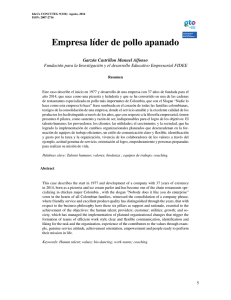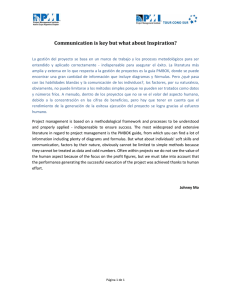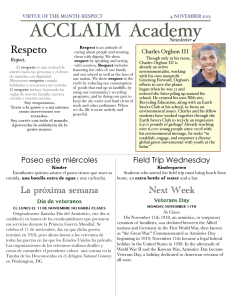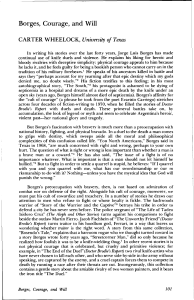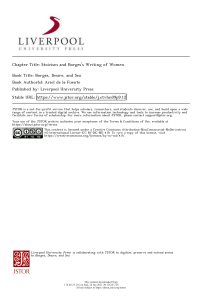Daniel Balderston - Borges Center
Anuncio
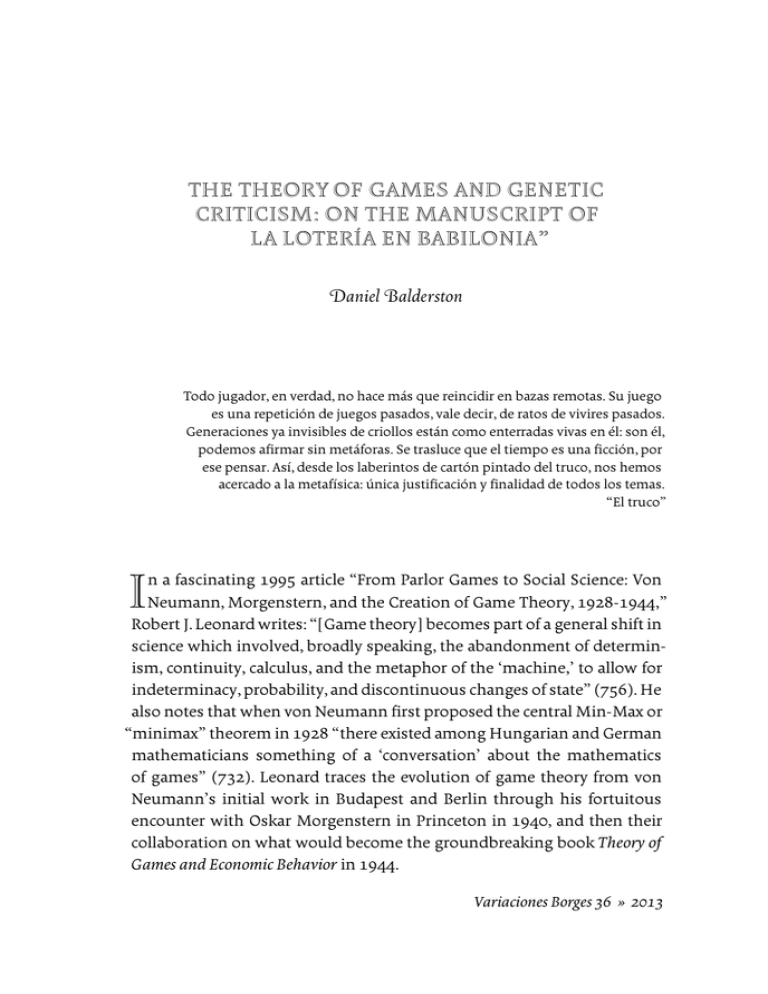
The Theory of Games and Genetic
Criticism: On the Manuscript of
La lotería en Babilonia”
Daniel Balderston
Todo jugador, en verdad, no hace más que reincidir en bazas remotas. Su juego
es una repetición de juegos pasados, vale decir, de ratos de vivires pasados.
Generaciones ya invisibles de criollos están como enterradas vivas en él: son él,
podemos afirmar sin metáforas. Se trasluce que el tiempo es una ficción, por
ese pensar. Así, desde los laberintos de cartón pintado del truco, nos hemos
acercado a la metafísica: única justificación y finalidad de todos los temas.
“El truco”
I
n a fascinating 1995 article “From Parlor Games to Social Science: Von
Neumann, Morgenstern, and the Creation of Game Theory, 1928-1944,”
Robert J. Leonard writes: “[Game theory] becomes part of a general shift in
science which involved, broadly speaking, the abandonment of determinism, continuity, calculus, and the metaphor of the ‘machine,’ to allow for
indeterminacy, probability, and discontinuous changes of state” (756). He
also notes that when von Neumann first proposed the central Min-Max or
“minimax” theorem in 1928 “there existed among Hungarian and German
mathematicians something of a ‘conversation’ about the mathematics
of games” (732). Leonard traces the evolution of game theory from von
Neumann’s initial work in Budapest and Berlin through his fortuitous
encounter with Oskar Morgenstern in Princeton in 1940, and then their
collaboration on what would become the groundbreaking book Theory of
Games and Economic Behavior in 1944.
Variaciones Borges 36 » 2013
Naturalmente, esas “loterías” fracasaron. Su virtud moral era nula. No se
dirigían a todas las facultades del hombre: únicamente a su esperanza.
Ante la indiferencia pública, los mercaderes que fundaron esas loterías venales comenzaron a perder el dinero. Alguien ensayó una reforma: la interpolación de unas pocas suertes adversas en el censo de rectángulos favorables. Mediante esa reforma, los compradores de rectángulos numerados
corrían el doble albur de ganar una suma y de pagar una multa a veces
cuantiosa. Ese leve peligro (por cada treinta números favorables había un
número aciago) despertó, como es natural, el interés del público. Los babilonios se entregaron al juego. El que no adquiría suertes era considerado un
pusilánime, un apocado. Con el tiempo, ese desdén justificado se duplicó.
Era despreciado el que no jugaba, pero también eran despreciados los
perdedores que abonaban la multa. La Compañía (así empezó a llamársela
entonces) tuvo que velar por los ganadores, que no podían cobrar los premios si faltaba en las cajas el importe casi total de las multas. Entabló una
demanda a los perdedores: el juez los condenó a pagar la multa original y
las costas o a unos días de cárcel. Todos optaron por la cárcel, para defraudar a la Compañía. De esa bravata de unos pocos nace el todopoder de la
Compañía: su valor eclesiástico, metafísico. (OC 456-57)
We will return later to the manuscript of this paragraph, but it is worth
noting the importance in this description of the ways in which the modification of the rules of the game affects its success, and the insistence that
the whole population (or almost all of it) participated in the game. Both
the importance of the ways a game is shaped by its rules and the ways in
which behavior changes depending on the number of players are major
themes of Theory of Games and Economic Behavior.
The great novelty in Borges studies of the last several years is Borges,
libros y lecturas: Laura Rosato and Germán Álvarez of the Biblioteca Nacional in Buenos Aires did excellent work tracking down the thousand or so
books that Borges donated to the library in 1973, and then transcribed
and commented on his annotations to some 250 of these. Because of
this monumental publication, we now know that Borges was sufficiently
interested in mathematics to write these words in 1937, in the back of
Egmont Colerus’s Von Pythagoras bis Hilbert: Die Epochen der Mathematik
unde ihre Baumeister:
una sucesión se llama infinita o indefinida si consta de un número infinito de términos. una suma de infinitos términos que tiende a un número
finito a medida que se toma mayor número n de sumandos, se llama serie
convergente.
una suma de infinito número de términos, tal que su valor absoluto crece
indefinidamente con el número n de sumandos que se tomen, se llama serie divergente. (la progresión aritmética indefinida es siempre divergente.)
(Rosato and Álvarez 90)
And of course he wrote a review of Edward Kasner and James Newman’s
Mathematics and the Imagination in Sur in 1940 that would be included in
the second edition of Discusión fifteen years later, in which he states that
he expects this book will join Mauthner’s Wörterbuch der Philosophie, Liddell Hart’s History of the World War 1914-1918, Lewes’s Biographical History
of Philosophy, Boswell’s Life of Johnson and Gustav Spiller’s The Mind of Man
as favorite books to read and write in. He notes of the Kasner and Newman
book:
Sus cuatrocientas páginas registran con claridad los inmediatos y accesibles encantos de las matemáticas, los que hasta un mero hombre de
letras puede entender, o imaginar que entiende: el incesante mapa de
Brouwer, la cuarta dimensión que entrevió More y que declara intuir How-
157
The Hteory of Games and Genetic Criticism
Daniel Balderston
156
I wouldn’t be here today if it weren’t for the publication of this book,
because my mother left a graduate program in mathematics at Columbia
University to become Morgenstern’s research associate at the Institute for
Advanced Study in Princeton, where she met my father, who had come
to Princeton University to work on his doctorate in economics under the
direction of Morgenstern. Out of this meeting of a Jewish girl from New
York and a Quaker boy from Philadelphia came a family–over the opposition of my maternal grandparents, and certainly of my father’s stepmother.
At the wedding my Jewish grandmother is said to have asked my Quaker
grandfather if anyone had ever married outside their faith, to which he
is said to have replied, “Yes, someone once married a Presbyterian.” That
may be legend, but we do know that in January 1949 my mother wrote her
parents an anguished letter asking them to stop their opposition to the
relationship, and she says there: “I do believe that there is a difference between selfishness and control over one’s own fate–and that I am not being
selfish in wanting to decide for myself what is best, and what I seek most
in life.” Even such a plea was framed in the logic of the theory of games.
What does all of this have to do with Borges, or specifically with “La
lotería en Babilonia”? A crucial paragraph of the story reads:
Daniel Balderston
158
It is fairly clear, then, that he was intensely interested in trying to understand some problems and paradoxes in mathematics in the period from
1937 to 1941.
Of particular importance here is the mention of L. E. J. Brouwer, whose
work on endless maps is discussed in detail by Kasner and Newman for
ten pages starting on page 287. Theory of Games notes the importance of
Brouwer in von Neumann’s first versions of the Min-Max problem:
The proof of our theorem, given in the first [1928] paper, made a rather
involved use of some topology and of functional calculus. The second
[1937] paper contained a different proof, which was fully topological and
connected the theorem with an important device of that discipline: the
so-called “Fixed Point Theorem” of L. E. J. Brouwer. (154)
Though there is no discussion of game theory itself in the Kasner and
Newman book, some of its underpinnings are mentioned.
“La lotería en Babilonia” was published in Sur in January 1941, just
three months after the publication of the review of Kasner and Newman in the same magazine. I am not going to imitate Alberto Rojo and
claim–as Rojo does with the anticipation of the 1957 Everett hypothesis
of many worlds in the 1941 story “El jardín de senderos que se bifurcan”–
that Borges anticipates by three years the central idea of a groundbreaking
work in mathematical economics–maybe he did that for quantum physics
but not necessarily for game theory. But it is clear, and the language of
the paragraph above confirms this, that he was intensely interested in the
interplay of logic and chance in the social world. Perhaps this was a way of
retreating from the hellish world of 1941 (as he had suggested a translation of Browne’s Urne Buriall could be at the end of “Tlön” in the previous
year): there is a lot in “La lotería en Babilonia” that suggests a social world
in disarray. I will claim, though, that what Leonard calls “something of a
‘conversation’ about the mathematics of games” is a useful way of thinking about “La lotería en Babilonia,” with its exquisite precision about the
shifting rules of the great game that has taken over a society.1 And here is
the sentence, a bit more than halfway through the story, that clinches the
case: “Por inverosímil que sea, nadie había ensayado hasta entonces una
teoría general de los juegos” (459) .
Let’s look now at the manuscript of the paragraph cited earlier, so we
can see what Borges was concerned about as he wrote. I should explain
that I am working on a book on Borges’s compositional practices, using
the insights and techniques of French critique génétique and of related
kinds of scholarship elsewhere; this project, then, forms part of a much
larger project on how Borges wrote, which has illuminated the relations
between the references in Borges’s work, his marginalia (especially what
has been published in Borges, libros y lecturas) and his notes and manuscripts. What follows is a diplomatic transcription (that is, a transcription
that shows precisely the order in which the lines were written, paying attention to alternatives and changes of direction). The manuscript, which is
in the manuscript division of the New York Public Library, has this version
of our paragraph:
Naturalmente, esas “loterías” fracasaron. Su virtud moral era nula. No se
facultades
su codicia.
dirigían a todas las potencias del hombre: únicamente a la esperanza. Ante
los mercaderes que fundaron esas loterías venales,
la indiferencia pública, las personas venales q. habían instituido esas loterías,
comenzaron a perder el
{inventó
empezaron a perder su dinero. Alguien ensayó una reforma: la interpolación de
números
unas pocas suertes adversas en el censo de suerte favorables. Mediante
esa reforma, los compradores de rectángulos numerados corrían el doble
a veces cuantiosa. Ese
albur de ganar una suma y de pagar una multa considerable. Ese leve
aciago) despertó,
leve peligro (por cada treinta números favorables había un número adverso)
aumentó,
El
1 Silvia Dapía in an article in this same issue of Variaciones discusses the relevance of a
competing economic model from the same period to the story.
159
The Hteory of Games and Genetic Criticism
ard Hinton, la levemente obscena tira de Moebius, los rudimentos de la
teoría de los números transfinitos, las ocho paradojas de Zenón, las líneas
paralelas de Desargues que en el infinito se cortan, la notación binaria que
Leibniz descubrió en los diagramas del I King, la bella demostración euclidiana de la infinidad estelar de los números primos, el problema de la
torre de Hanoi, el silogismo dilemático o bicornuto. (276)
como es natural, el interés del público. Los babilonios se entregaron al juego.
Quienes
que no adquiría suertes era considerado un pusilánime, un apocado. Con el
no adquiría suertes eran considerados pusilánimes, apocados. Con el
justificado se duplicó.
Prefirió borrajear en los escombros de una fábrica de caretas un argumento breve, que ahora figura en las escrituras sagradas. Esa pieza doctrinal
observaba que la lotería es una interpolación del azar en el orden del mundo y que aceptar errores no es contradecir el azar: es corroborarlo. (458)
The manuscript shows an intense process of rewriting:
tiempo, ese desdén se enriqueció. Era despreciado el que no jugaba, pero tam
replicó {borrajear en los escombros de
argumento breve que ahora figura en todas las antologías de carácter didác-
{los ganadores, que no
(así empezó a llamársela entonces) tuvo q. velar por {el interés de los
Daniel Balderston
Prefirió {inscribir en una pirámide un
bién eran despreciados los perdedores que abonaban la multa. La Compañía
los
una fábrica de caretas un argumento breve, que ahora figura en las escrituras
tico.
ganadores,} q. no podían cobrar sus premios si faltaba en las cajas
sagradas. Esa pieza doctrinal
canónicas. Esa pieza didáctica observaba que la lotería {no es otra cosa que
{una demanda a los perde-
el importe casi total de las multas. Entabló {demanda a los perde-
{ es una
{es una
dores: el juez los condenó a pagar la multa original y las costas
o a unos días de cárcel. Todos optaron por la cárcel, para defraudar a la
una} interpolación del azar en el orden del mundo y que aceptar {noticias
bravata
1 nació
{todopoder de la
Compañía. De esa decisión de unos pocos 2 nace el {poder actual de
{errores
corroborarlo.
erróneas} no es contradecir el azar: es confirmarlo.
Compañía: su valor eclesiástico, metafísico.
la Compañía: su {importancia teológica, metafísica.
161
{valor eclesiástico, metafísico.
In my other recent articles on Borges’s compositional processes I have
noted that the important and complex nodes in the manuscripts (the
opening of “Hombre de la esquina rosada” or the last paragraph of “La
muralla y los libros,” for instance) are the ones where there is most intense rewriting. Certainly in this case Borges is interested in expressing
with as much as precision as possible the evolving logic of the game, and
in fact a line in the story that comes almost immediately after this paragraph is: “Nadie ignora que el pueblo de Babilonia es muy devoto de la
lógica, y aún de la simetría” (457). The manuscript also confirms that he
moves gently in the direction of a more mathematical description of the
game: “Con el tiempo, ese desdén se enriqueció” changes to “ese desdén
justificado se duplicó.”
Another moment in the story where the manuscript shows significant amounts of interesting rewriting is the part about the “doctrine” of
chance that rules the world of the lottery. The published version reads:
Again we see an attention to the precise language that defines the
statement of doctrine: not canon, not didacticism, not an anthology, but
a “pieza doctrinal” scribbled in the ruins of a mask factory. The “game”
idea is fortified here, as the central place where the importance of chance
in the universe of the story is written is not chiseled words on a religious
monument or some pyramid but graffiti scribbled in a place associated
with carnival festivities.
Other important places in the universe of the story are some stone lions and a sacred latrine. The published text reads: “Había ciertos leones de
piedra, había una letrina sagrada llamada Qaphqa” (408) . The manuscript,
unsurprisingly, reads:
Había ciertos leones de piedra, había
Qaphqa,
una letrina sagrada llamada Kafka,
The Hteory of Games and Genetic Criticism
160
la multa. La Compañía
during a visit to Buenos Aires organized by the SADOI, the Sociedad Argentina de Organización Industrial. The conversation between Simon
and Borges focuses on the former explaining to the latter that he found
relevant to his work in computing and artificial intelligence Borges’s use
of the image of the labyrinth. “La lotería en Babilonia” is not mentioned
explicitly but I hope I have showed by now its productivity for work in
theory of games and decision-making.
The second instance I will mention briefly is sociologist James M. Jasper “The Dilemmas of Game Theory,” which has an epigraph from “Pierre
Menard, autor del Quijote.” Jasper’s discussion of rational choice theory
and classic game theory invokes Borges, again without specifically referring to “La lotería en Babilonia.”3 Jasper’s work suggests that Borges’s
writing is relevant to contemporary approaches to game theory, just as
Nicolas Rescher (92-101, 105-06) and Alberto Rojo (Borges e a mecânica
quântica, passim) have shown its importance for quantum physics.
The story ends with the sentence: “Babilonia no es otra cosa que un infinito juego de azares” (460), which in an earlier version of the manuscript
reads: “el universo no es otra cosa que un infinito juego de azares.” (The
earlier version links this story explicitly to the beginning of “La biblioteca de Babel,” published a few months later in El jardín de senderos que
se bifurcan). As I explained earlier, being myself the product of an infinite
game of chance that derived quite specifically from the 1944 publication
of The Theory of Games and Economic Behavior, I cannot but feel some wonderment that Borges anticipates by three years the application of game
theory–which, as Leonard explains in the article I mentioned at the beginning of this paper, von Neumann had been working out for some fifteen
years before he met Morgenstern, but thinking about what Leonard calls
“parlor games” like chess and poker–to the economic sphere. It is only after
von Neumann teamed up with Morgenstern that they attempted to apply the mathematical structure of games to large real-world situations like
2 I have seen photocopies of three pages of an issue of Sur that includes the original
publication of the story and countless emendations by Borges for a rewriting of it that
were never incorporated into the versions in Ficciones and Obras completas. In the case of
Kafka/Qaphqa, Borges’s marginal annotation here reads Qaphqha. The story was to be
renamed “El babilónico azar.”
3 Jasper’s chapter is on his website, and seems to be an early version of a section of his
book Getting Your Way. The latter, however, does not make reference to Borges, though
the fascinating appendix, “Rules of Strategic Action,” does refer to one of Borges’s favorites, Basil Henry Liddell Hart (as well as to Saul Alinsky and to Mao Tse-Tung), who
made a list that governed military engagement.
163
The Hteory of Games and Genetic Criticism
Daniel Balderston
162
The evocation of Kafka here points to the same Central European world
which von Neumann fled in 1930 (returning from time to time until 1939)
and Morgenstern in 1940, and of course Stanley Corngold has importantly
shown the relations between Kafka’s day job as an insurance lawyer (and
one of the pioneers of workers’ compensation law) and his writing. This
quiet emendation has never fooled anyone: “Qaphqa” and “Babilonia”
point to the ancient Orient, as do the mentions of the river Euphrates, the
ancient sapphire mine of Taprobana and the emperor Heliogabalus, but
the world of Kafka’s parables (which of course also include their share
of “Oriental” settings) pull in the direction of the conflicts of modernity.2
Theory of Games and Economic Behavior (in its original 1944 version
and in the revised second edition of 1947) focuses famously on zerosum games, including ones with many participants; these have the same
number of losses and wins. In the decade following its publication there
were important advances in the study of non-zero-sum games, including
the famous “Prisoner’s Dilemma” (first formulated in 1950). Because of
the chaotic nature of the game in the Borges story, with its shifting rules
and universal participation, it would seem to be a game of the latter kind,
though I will leave for the moment the question of whether the rather
vague terms in which its rules are described could be formulated mathematically.
In closing I would like to mention a couple of instances that show
Borges’s importance for mathematical economics and game theory in the
years following the publication of his story. The first is a brief article that
appeared in Primera Plana on January 5, 1971, “Primera Plana va más lejos
con Herbert Simon y Jorge Luis Borges,” which Alberto Rojo had the kindness to share with me. In it, a reporter for the famous Buenos Aires magazine accompanies Simon, who would win the Noble Prize in Economics
in 1978 but who was already renowned in 1971 for his work in decisionmaking and as a pioneer in the emerging field of artificial intelligence,
when he goes to visit Borges at the Biblioteca Nacional on Calle México
economic behavior of large numbers of people (or players), precisely the
sort of situation that is at the center of “La lotería en Babilonia.”
Works Cited
Borges, Jorge Luis. “La lotería en Babilonia.” MS. New York Public Library.
Daniel Balderston
University of Pittsburgh
164
—. Obras completas. Buenos Aires: Emecé, 1974.
Braude, Judith S. Unpublished letter to Paul and Anne Braude. 1949.
Corngold, Stanley, Jack Greenberg and Benno Wagner, ed. Frank Kafka:
The Office Writings. Princeton: Princeton UP, 2008.
165
—. Getting Your Way: Strategic Dilemmas in the Real World. Chicago: U Chicago P, 2006.
Leonard, Robert J. “From Parlor Games to Social Science: Von Neumann,
Morgenstern, and the Creation of Game Theory, 1928-1944.” Journal of Economic Literature 33 (1995): 730-61.
Morgenstern, Oskar. “The Collaboration between Oskar Morgenstern and
John von Neumann on the Theory of Games.” Theory of Games and
Economic Behavior: Sixtieth-Anniversary Edition. Princeton: Princeton
UP, 2004. 712-26.
“Primera Plana va más lejos con Herbert Simon y Jorge Luis Borges.” Primera Plana 414 (5 January 1971): 42-45.
Rescher, Nicholas. The Primacy of Practice: Essays toward a Pragmatically
Kantian Theory of Empirical Knowledge. Oxford: Basil Blackwell, 1973.
Rojo, Alberto. El azar en la vida cotidiana. Buenos Aires: Siglo XXI, 2012.
—. Borges e a mecânica quântica. Trans. Mârcia Aguiar Coelho. Campinas:
Editora Unicamp, 2011.
Rosato, Laura and Germán Álvarez. Borges, libros y lecturas. Buenos Aires:
Biblioteca Nacional, 2010.
von Neumann, John and Oskar Morgenstern. Theory of Games and Economic Behavior. 2nd ed. Princeton: Princeton UP, 1947.
The Hteory of Games and Genetic Criticism
Daniel Balderston
Jasper, James. “The Dilemmas of Game Theory.” www.jamesmjasper.org/
files/chap3.old.wpd






